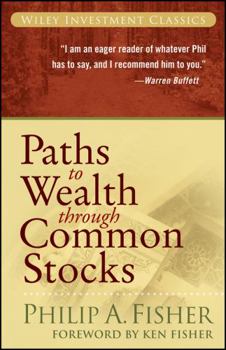Paths to Wealth Through Common Stocks
Select Format
Select Condition 
Book Overview
Paths to Wealth through Common Stocks contains one original concept after another, each designed to greatly improve the results of those who self-manage their investments -- while helping those who rely on professional investment advice select the right advisor for their needs.
Originally written by investment legend Philip A. Fisher in 1960, this timeless classic is now reintroduced by his well-known and respected son, successful money manager Ken Fisher, in a new Foreword.
Filled with in-depth insights and expert advice, Paths to Wealth through Common Stocks expands upon the innovative ideas found in Fisher's highly regarded Common Stocks and Uncommon Profits -- summarizing how worthwhile profits have been and will continue to be made through common stock ownership, and revealing why his method can increase profits while reducing risk. Many of the ideas found here may depart from conventional investment wisdom, but the impressive results produced by these concepts -- which are still relevant in today's market environment -- will quickly remind you why Philip Fisher is considered one of the greatest investment minds of our time.
Originally written by investment legend Philip A. Fisher in 1960, this timeless classic is now reintroduced by his well-known and respected son, successful money manager Ken Fisher, in a new Foreword.
Filled with in-depth insights and expert advice, Paths to Wealth through Common Stocks expands upon the innovative ideas found in Fisher's highly regarded Common Stocks and Uncommon Profits -- summarizing how worthwhile profits have been and will continue to be made through common stock ownership, and revealing why his method can increase profits while reducing risk. Many of the ideas found here may depart from conventional investment wisdom, but the impressive results produced by these concepts -- which are still relevant in today's market environment -- will quickly remind you why Philip Fisher is considered one of the greatest investment minds of our time.
Format:Paperback
Language:English
ISBN:0470139498
ISBN13:9780470139493
Release Date:August 2007
Publisher:Wiley
Length:240 Pages
Weight:0.75 lbs.
Dimensions:0.7" x 5.6" x 8.4"
Customer Reviews
2 ratings
review
Published by Thriftbooks.com User , 15 years ago
Not the breakthrough in qualitative analysis Common Stock and Uncommon Profits was. Still a great read and this has many ideas to offer. A few great "how to " stories, of particular enjoyment to me is the story about the Dr., his expensive wives, and a bit of capital.
It's many great parts more than make up for its age
Published by Thriftbooks.com User , 18 years ago
With due respect to my fellow reviewers, this book contains some of the best passages describing inflation, the real effects of Federal Reserve rate cuts and hikes (as surprising today as it was then---Fisher asserts that a loose monetary policy encourages deflation), technology as a major brake on inflation, as well as something that has received very little attention in my reading experience: the quality of management. We all know Warren Buffet (who saw Fisher as a mentor) buys companies with strong earnings growth potential and an above-average management. But what makes up an outstanding management team? This is one of the best questions that I've never asked myself and had never found an answer to, but this book starts to address it. Evaluating management teams is something that is valuable in investing but also for selecting an employer or running a company, I think. In addition to these points, the discussion of mergers and acquisitions is also lucid and as relevant today as it was fifty years ago. So, if you're into stock picking a la Cramer, or maybe a bundle of ETFs is more your cup of tea, or perhaps you really bought Malkiel's advice on indexing, this book won't tell you too much specifically about these themes (Andrew Tobias covers some of that well). But at the center of investing lies a business, and this book really helped me understand more about businesses. Even if I don't ever evaluate companies and pick stocks, I think that this understanding will become increasingly valuable to me not only as an investor, but also as an employee and an entrepreneur. Parting thoughts. Today, the speed that knowledge about a firm spreads is completely beyond that of 1959---adjust your framework accordingly. The sections on selecting "the right investment man" are of historic interest only. Also, the world of foreign investing has changed a lot over the last 50 years. A more general thought: investors, old and young, might do well to remember that these last 25 years (1982-2007) have seen spectacular returns in many, many markets (especially in equities), and should discount for this fact when digesting modern investment reading. Cramer and his buddies of twenty-five years don't know the meaning of the words 'recession' or 'bear market'. If you've been investing in this time period based on hunches, don't be surprised if you did really well. These next couple of decades promise to be much more interesting, in that they seem to offer far better gains to those who are truly prepared. And that involves evaluating a lot of history and really understanding it.






